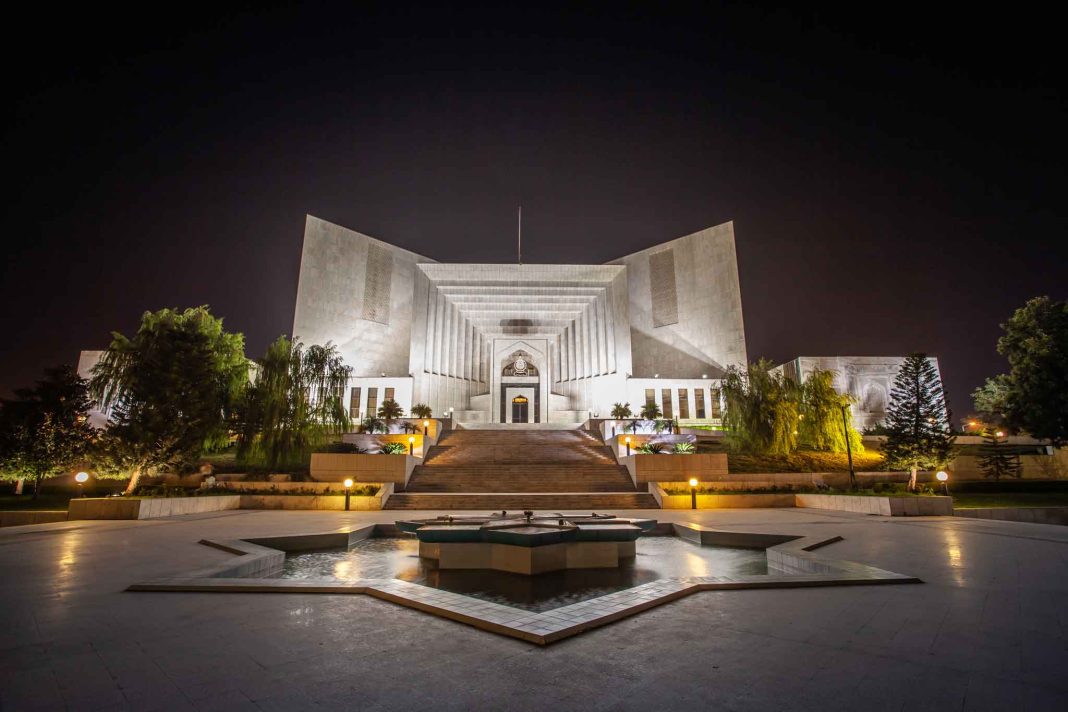ISLAMABAD: The Islamabad High Court (IHC) Bar moved the Supreme Court on Thursday against the alleged interference in the judiciary and its functions.
In an unprecedented move, Justice Mohsin Akhtar Kiyani, Justice Tariq Mehmood Jahangiri, Justice Babar Sattar, Justice Sardar Ejaz Ishaq Khan, Justice Arbab Muhammad Tahir and Justice Saman Rafat Imtiaz penned a letter to the SJC, led by Chief Justice Qazi Faez Isa, last month and expressed concerns about the “interference” of intelligence agencies in the affairs of the courts.
The Bar filed a constitutional petition to investigate the letter sent by the IHC judges and demanded a transparent investigation into the matter. Following a transparent investigation, action should be taken against those aiming to humiliate the ju-diciary, the petition stated.
The petition added that if the matter is related to the SJC, the court should send recommendations to the council for review.
The Bar further stated in the plea that “independent judiciary was the basis of the Constitution and only source of justice; compromise on judiciary’s independence will never be accepted”.
The Human Rights Commission of Pakistan (HRCP) also voiced profound apprehension over allegations made by six high court judges regarding alleged interference and intimidation by the state’s intelli-gence agencies, suggesting that such actions have severely compromised the independence of the judiciary. HRCP expressed distress over reports of judges’ relatives being subjected to abduction and torture allegedly by intelligence personnel as a means of intimidation. Additionally, revelations of ille-gal surveillance conducted in judges’ homes further underscored the erosion of judicial independ-ence, it said.
Highlighting the broader implications of such interference, the HRCP warned that if higher court judges are susceptible to such blatant interventions, lower courts might be even more vulnerable. Such au-thoritarian tactics, the rights watchdog argued, have compromised the integrity of the legal system, hindering people’s access to justice—a fundamental right enshrined in the Constitution.
The matter worsened when members of the superior judiciary started receiving threatening powder-laced letters. A total of 10 judges including Justice Ayesha Malik, Justice Irfan Saadat Khan, Justice Mu-hammad Ali Mazhar, Justice Syed Hasan Azhar Rizvi, and Justice Muneeb Akhtar were the recipients of these intimidating letters.
A day later, the letters containing the suspicious powdery toxic substance were sent to the Supreme Court jurists, including Chief Justice of Pakistan Qazi Faez Isa, as well as other judges of the LHC.
The federal government appointed former chief justice of Pakistan Tassaduq Hussain Jillani as the head of an inquiry commission tasked with investigating allegations of intelligence agencies meddling in the affairs of the Islamabad High Court (IHC).
The decision to approve the formation of an investigation body and to nominate Jillani as its head was made during a meeting of the federal cabinet chaired by Prime Minister Shehbaz Sharif.
Later Jillani recused himself from heading a one-man inquiry commission formed by the government to investigate the claims and so the apex court took suo motu notice of a letter.
The situation unfolded after a group of lawyers and civil society members urged the top court to initi-ate suo motu proceedings on the matter, as it rejected the ‘powerless’ one-man commission. –Agencies



